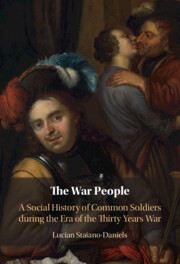Book contents
- The War People
- The War People
- Copyright page
- Epigraph
- Contents
- Figures
- Tables
- Acknowledgments
- Notes on Money, Dates, Ranks, and Measurements
- The People
- Introduction
- 1 Display All Good Will and Keep Moving
- Scene I Hieronymus Sebastian Schutze and Hans Devil
- Scene II Hieronymus Sebastian Schutze, Felix Steter, and Wolfgang Winkelmann
- Conclusion
- Bibliography
- Index
Conclusion
A Beautiful Regiment
Published online by Cambridge University Press: 19 December 2024
- The War People
- The War People
- Copyright page
- Epigraph
- Contents
- Figures
- Tables
- Acknowledgments
- Notes on Money, Dates, Ranks, and Measurements
- The People
- Introduction
- 1 Display All Good Will and Keep Moving
- Scene I Hieronymus Sebastian Schutze and Hans Devil
- Scene II Hieronymus Sebastian Schutze, Felix Steter, and Wolfgang Winkelmann
- Conclusion
- Bibliography
- Index
Summary
The Mansfeld Regiment’s social organization and material contexts shaped the way it was formed, the path it took from Dresden to Lombardy, and the way it disintegrated. The concepts of the military revolution and the fiscal-military state are still relevant. But developing fiscal-military infrastructure was weak, which laid the groundwork for the Mansfeld Regiment’s loss of funding and failure. In this regiment’s daily operations I did not see the changes in social discipline that were supposedly intertwined with the military revolution. What I have found about the Mansfeld Regiment and the Saxon army may serve as a basis for re-examining some historical assumptions about early seventeenth-century armies. Daily interactions within this pathetic regiment are also an important source for the historical social anthropology of early-modern Europe, shedding light on masculinity, violence, identity formation, and marginalization.
Keywords
- Type
- Chapter
- Information
- The War PeopleA Social History of Common Soldiers during the Era of the Thirty Years War, pp. 191 - 199Publisher: Cambridge University PressPrint publication year: 2024

